You are currently browsing the tag archive for the ‘Safe Routes to School’ tag.
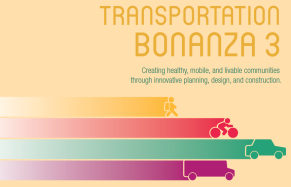 The Michigan Association of Planning, in partnership with the Michigan Safe Routes to School (SR2S) Program, the Michigan Department of Transportation (MDOT), the Michigan Department of Community Health (MDCH), and the Michigan Municipal League (MML), is launching its 3rd annual Transportation Bonanza! This event was designed to bring together professionals from the fields of planning, education, transportation, health, engineering, natural resource and environmental protection, architecture, landscape architecture, and others to align around the topic of community building for health and accessibility.
The Michigan Association of Planning, in partnership with the Michigan Safe Routes to School (SR2S) Program, the Michigan Department of Transportation (MDOT), the Michigan Department of Community Health (MDCH), and the Michigan Municipal League (MML), is launching its 3rd annual Transportation Bonanza! This event was designed to bring together professionals from the fields of planning, education, transportation, health, engineering, natural resource and environmental protection, architecture, landscape architecture, and others to align around the topic of community building for health and accessibility.
We think that this year’s focus on the crossroads of schools and communities might appeal to your membership, constituents, partners, and/or staff. Transportation Bonanza 3 will deliver national and state experts to explore school facilities planning, how to implement Safe Routes to School successfully, collaborations between school districts and communities, public policies that impact the education system, and more.
Through valuable partnerships, the Transportation Bonanza series has continued to evolve from general transportation topics in its inaugural year to this year’s conference focusing on understanding the relationships between schools, community, and transportation; Safe Route to School; and Complete Streets. The benefits of attending are many and
include:
- Learning about the intricacies and interconnectedness of communities, public health, schools, and transportation
- Being better equipped to work with colleagues across multiple disciplines
- The registration price is a good value for the information provided
- Networking with colleagues across multiple disciplines
Just as the road networks we use to transport ourselves and our goods across multiple jurisdictions and cut through a variety of landscapes, so too do transportation planners, engineers, and advocates work with and through a variety of disciplines to enhance and improve our road systems. While each session is designed to relate to transportation in a unique way, from the relationship to schools to local government funding, there is an entire track dedicated to Context Sensitive Solutions and Complete Streets.
Date: February 16, 2012
Location: Lansing Center, Lansing
8:00 AM to 5:15 PM
Program: A full day of national experts and local perspectives, includes lunch, instruction, and refreshments.
Registration: $49 and online at http://planningmi.org/tb.asp
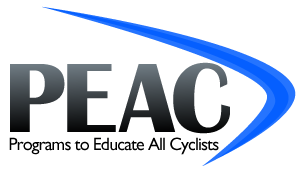 On Saturday, April 16th, Programs to Educate all Cyclists (PEAC) will be breaking new ground once again by holding the first mobility audit for a Safe Routes to School (SRTS) program. PEAC invites students, parents, community leaders and the general public to participate in conducting an audit of the sidewalks and streets around Saline. PEAC will be assessing the area for use with both handbikes and wheelchairs. Approximately 16 handbikes will be available for use by volunteers courtesy of the Disability Hall of Fame. Instruction will be provided by Glen Ashlock, a member of the Disability Hall of Fame. This is a free event and a great opportunity to help make Saline a safer community for all pedestrians and cyclists.
On Saturday, April 16th, Programs to Educate all Cyclists (PEAC) will be breaking new ground once again by holding the first mobility audit for a Safe Routes to School (SRTS) program. PEAC invites students, parents, community leaders and the general public to participate in conducting an audit of the sidewalks and streets around Saline. PEAC will be assessing the area for use with both handbikes and wheelchairs. Approximately 16 handbikes will be available for use by volunteers courtesy of the Disability Hall of Fame. Instruction will be provided by Glen Ashlock, a member of the Disability Hall of Fame. This is a free event and a great opportunity to help make Saline a safer community for all pedestrians and cyclists.
The event begins at 9:30 am at Liberty School Cafeteria, 7265 N. Ann Arbor St., Saline, MI 48176
April 16th, 2011 9:30 a.m. - noon
Programs to Educate all Cyclists (PEAC) is a national leader in the field of teachin
g individuals with disabilities cycling skills. PEAC’s mission is to enhance the lives of individuals with disabilities by using cycling for transportation, integrated recreation, fitness, and therapy.
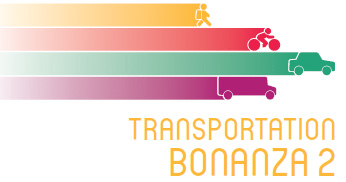 The Michigan Association of Planning, in partnership with the Michigan Department of Community Health, Michigan Department of Transportation, Michigan Safe Routes to School program, Michigan Municipal League, and the MI Chapter – Congress for New Urbanism, is launching its second annual Transportation Bonanza! Slated for December 8 (Lansing Center) and 9th (Lansing Radisson), this comprehensive, multidisciplinary workshop provides the programming necessary to integrate land use and transportation policies with health and mobility agendas, and responds to the recent passage of complete streets legislation, which made Michigan the 14th state to embrace this integrated approach to planning, design and construction of transportation networks which provide safe, attractive and comfortable access for ALL users, from bicyclists and pedestrians, to the elderly and disabled, busses and trains, and the automobile.
The Michigan Association of Planning, in partnership with the Michigan Department of Community Health, Michigan Department of Transportation, Michigan Safe Routes to School program, Michigan Municipal League, and the MI Chapter – Congress for New Urbanism, is launching its second annual Transportation Bonanza! Slated for December 8 (Lansing Center) and 9th (Lansing Radisson), this comprehensive, multidisciplinary workshop provides the programming necessary to integrate land use and transportation policies with health and mobility agendas, and responds to the recent passage of complete streets legislation, which made Michigan the 14th state to embrace this integrated approach to planning, design and construction of transportation networks which provide safe, attractive and comfortable access for ALL users, from bicyclists and pedestrians, to the elderly and disabled, busses and trains, and the automobile.
Communities that create a culture that embraces transportation options for all users not only expands access to services and encourages healthy lifestyles, but also lowers traffic congestion, attracts and retains residents and businesses, supports mixed use and compact development, promotes economic development, and improves equity in transportation. Learn how YOUR community can enhance its livability, add value to residents, and attract investment by integrating elements that create vitality.
Learn what you can do locally to implement policies and programs that can transform your community, from DAY 1’s national livability experts Michael Ronkin, Harrison Rue, and Scott Windley to Day 2’s ITE Manual authorities Phil Caruso, Brian Bochner and G. Wade Walker.
Whether you are seeking a multi dimensional, motivating, and practical experience, or a technical guide for innovative applications - or BOTH - you will find value, inspiration and skills at MAP’s TB2.
Follow this link for online registration and to view the program brochure, with details about keynote speakers, session descriptions, and mobile workshops.
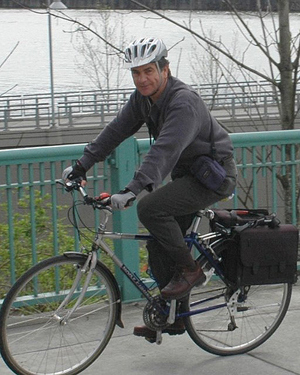 National bicycle and pedestrian expert, Michael Ronkin, was yesterday’s keynote speaker at the Michigan Transportation Planning Association and Michigan Association of Regions conference titled “Planning for Change in an Uncertain World.” The 34th annual conference started on July 13 and will conclude on the 16 and is being held in East Lansing.
National bicycle and pedestrian expert, Michael Ronkin, was yesterday’s keynote speaker at the Michigan Transportation Planning Association and Michigan Association of Regions conference titled “Planning for Change in an Uncertain World.” The 34th annual conference started on July 13 and will conclude on the 16 and is being held in East Lansing.
Yesterday’s speakers focused entirely on designing walkable and bike-able communities. Rory Neuner, State Network Manager for the Safe Routes to Schools National Partnership presented on Complete Streets while League of Michigan Bicyclists’ Executive Director Rich Moeller presented a Bikeability Assessment Guide for communities. Additionally, Meridian Township Treasurer, July Brixie highlighted her communities new Bicycle Parking Ordinance while MDOT’s Josh DeBruyn debunked liability concerns many communities have about putting in pedestrian and bicycle facilities. The nonmotorized sessions were rounded out by Dave Morena who discussed Road Diets and Wes Butch of DLZ Corp talked about roundabouts and the need to balance pedestrian mobility against motorist safety.
Following these breakout sessions, Tim Potter, manager of MSU Bikes Service Center, led a group of about 15 bikers on a tour across campus and through E. Lansing and Lansing.
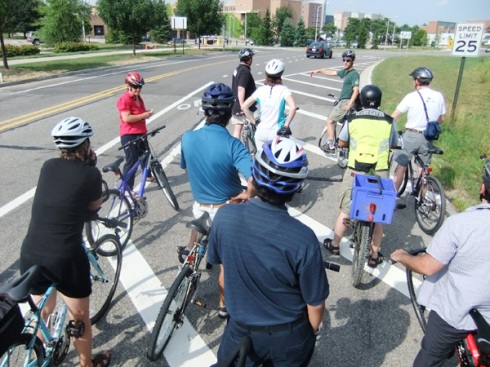 The group of bikers included not only Ronkin and Potter, but also a number of engineers, planners and politicians. Rich Moeller, Executive Director of the League of Michigan Bicyclists, said “It’s different when you see it by bike versus in your car,” “It’s hands-on (and) it allows them to get on their bike and see some of the issues bicyclists are facing. It helps them as planners and engineers to design things.”
The group of bikers included not only Ronkin and Potter, but also a number of engineers, planners and politicians. Rich Moeller, Executive Director of the League of Michigan Bicyclists, said “It’s different when you see it by bike versus in your car,” “It’s hands-on (and) it allows them to get on their bike and see some of the issues bicyclists are facing. It helps them as planners and engineers to design things.”
A short interview with Michael Ronkin was featured in today’s State News.
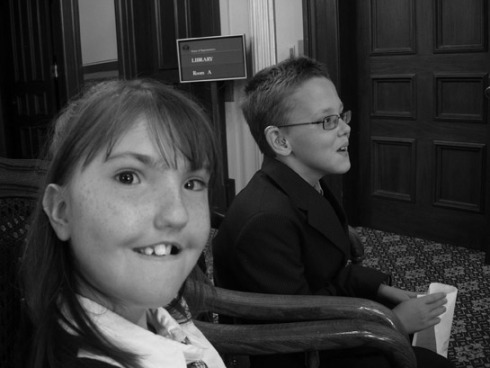
Katie Birchmeier (10) and Conor Waterman (9) before adressing the Michigan Disability Caucus on June 23.
On June 23 children with disabilities shared their transportation needs with members of Michigan’s Senate and House. These brave youth addressed the Michigan’s Disability Caucus in the Speaker’s Library of the State Capitol. Katie Birchmeier (10), Conor Waterman (9), James Kleimola (18) and Chris Mistopoulos (25), provided personal stories about their ability to access the community and the challenges they have faced while walking and biking in Michigan.
In addition, PEAC (Programs to Educate All Cyclists) addressed the bi-partisan, bi-cameral Michigan Legislative Disability Caucus. During a one-hour presentation PEAC focused on educating the Caucus about their mission and programs, and advocated for greater state support of cycling by persons with disabilities. PEAC is a Michigan based nonprofit that is recognized as the national leader for cyclists with disabilities.
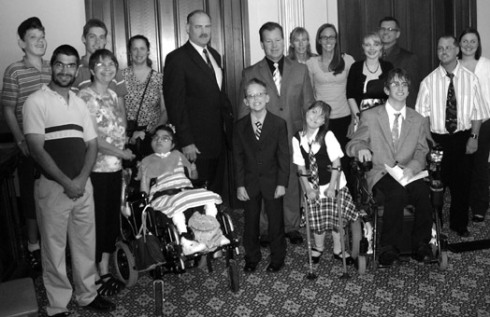
Representative John Gleason and Senator Randy Richarville with PEAC supporters in the Spearker's Library of the State Capitol.
The ability to travel in active modes of transportation is essential to access our community for all individuals. Bicycling can become the primary mode of travel for individuals who cannot get a driver’s license. A key component of the Complete Streets legislation that recently passed the Michigan House, and that is currently being considered by the Senate, is ensuring that streets meet the “varying mobility needs of all legal users of the roadway, of all ages and abilities.” The ability to travel independently is not just an access issue, but an issue of human dignity. Individuals forced to rely on family and friends to meet all transportation needs reinforce ideas regarding inabilities, burden to others and second class citizenship. Clearly, passing Complete Streets legislation would go along way towards establishing a statewide policy regarding equal access issues. Read the rest of this entry »
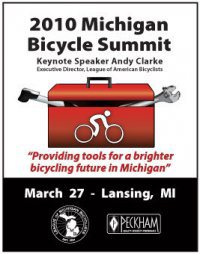 March 27th - 11:00 - 11:45am
March 27th - 11:00 - 11:45am
In the past year many exciting developments have occurred around Complete Streets in Michigan. A panel discussion at the 2010 Michigan Bicycle Summit will provide updates on these developments and provide suggestions on ways your community can go about adopting your own Complete Streets policy.
More Details/Registration:
http://www.lmb.org/index.php/events/mi-bike-summit.html















